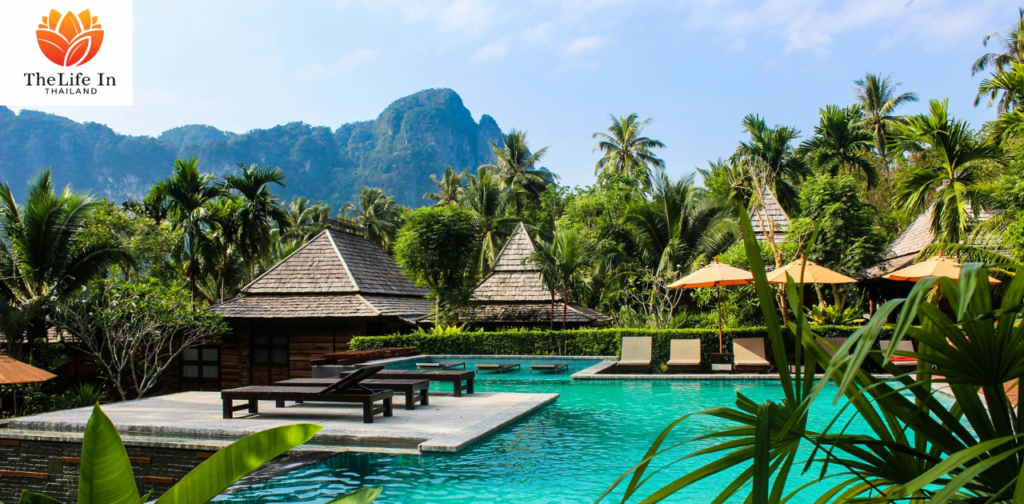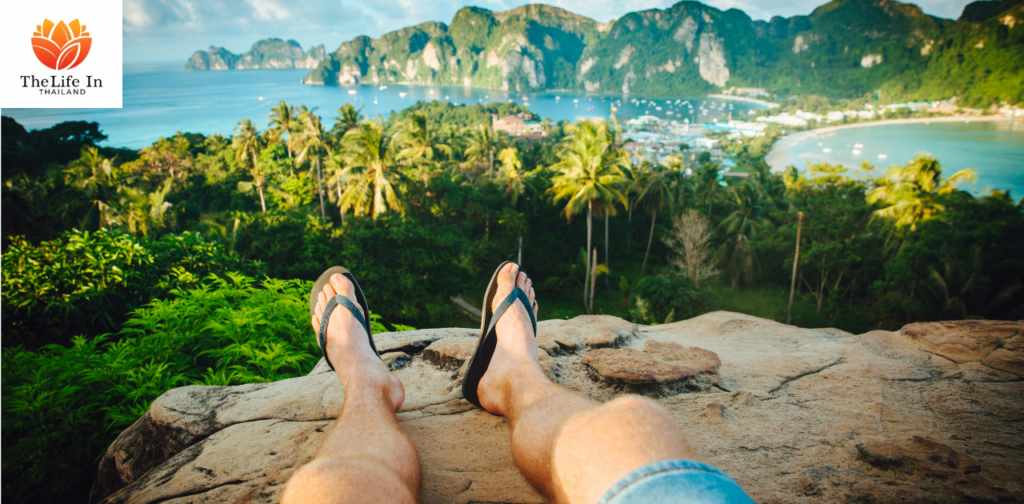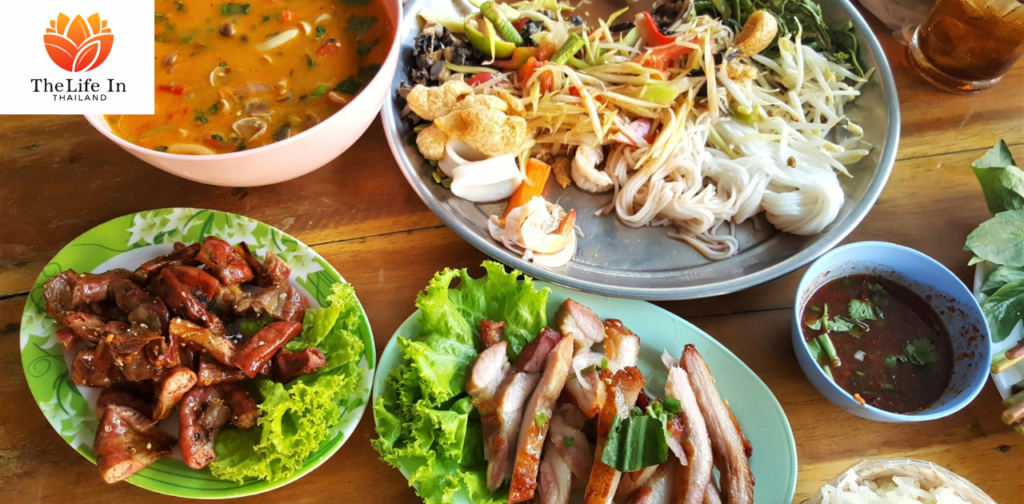Are you thinking about living your life in Thailand? With over 3.6 million migrants residing in Thailand as of 2022, accounting for 5.2% of the entire population, relocating to Thailand is growing increasingly popular among expats. Foreigners considering migrating to Thailand are drawn to the country for more than simply its picturesque beaches, tropical islands, and friendly, fun-loving people. Recent government infrastructure investment and a reviving economy have created more job prospects for people with specialized talents. A high level of living, good health care, private schools, and vibrant expat communities can be found in both huge, sophisticated cities like Bangkok and exotic islands like Phuket. Thailand is an ideal choice for individuals wishing to relocate due to its year-round pleasant weather, rich cultural history, and interesting, primarily Buddhist society.
If you’re wondering “Should I move to live in Thailand?” this information may help you decide. We’ll go over how to locate a job, a place to live, and some of the details of everyday living as an expat in Thailand.


Accommodation in Thailand
It is tough to own property in Thailand, but the country has a thriving rental market, so you will be spoiled for choice regardless of your budget. Thailand offers a wide selection of housing options, including studio flats, serviced condominiums, luxury villas, and bamboo beach bungalows. Most expats who travel to Bangkok select serviced apartments in the city’s commercial core, near the Skytrain, metro, and nightlife. Families could want a suburban home near an international school. Retirees are typically lured to the serenity of an island property or a classic residence in the country’s rural north. Most Thai houses are furnished, so get an inventory to be signed before you move in. While renting, you must pay for your phone line, water, and energy individually.
In Thailand, letting agents and landlords often need a deposit of two to three months’ rent. You will also be requested to sign a contract for a certain amount of months. To apply for a long-term rental, you must provide your passport, a copy of your work permit, and evidence of income.
Population
Thailand is presently home to around 70 million people. The majority of them are members of one of Thailand’s four ethnic groups, which originated in southern China roughly a thousand years ago. Aside from demographic minorities like the Khmer and Hmong, Thailand has a substantial Sino-Thai (Thai-Chinese) minority, particularly in Bangkok. Many Sino-Thais identify as multiracial, having ancestors from both communities and adopting Thai surnames. Ethnic Chinese in Thailand are also likely to be multilingual or trilingual, speaking Mandarin Chinese, the Chinese variety from their family’s old home location, and Thai.
Education in Thailand
Thailand’s state (public) schools provide a 12-year basic education, nine of which are mandated. Standards might vary, thus most expats send their children to one of the country’s foreign schools.
Homeschooling
Homeschooling is lawful in Thailand, as the legislation recognizes alternative education and views the home as an educational institution. You must apply to the government if you wish to homeschool your children.
Public schools
Independent schools that charge a fee are widely regarded as better than public schools in Thailand. Many are run by philanthropic organizations, including the Catholic Church.
International schools
Most expats in Thailand send their children to foreign schools, where subjects are often taught in their native language. Fees are exorbitant, and students are frequently required to study Thai language and culture as part of their curriculum. School managers and principals must be Thai natives, however there is typically an expat head teacher as well.
Travel & Tourism
One of the most compelling reasons you chose to relocate life in Thailand was the abundance of holiday destinations. It boasts lovely beaches, unspoiled islands, verdant woods, breathtaking temples, and misty mountains. Life in Thailand is a well-known tropical paradise in the globe, with excellent hotels, well-maintained tourist attractions, and an incredible culture. It also serves as a Southeast Asian center, with easy access to neighboring nations like as Laos, Cambodia, Malaysia, Vietnam, and Indonesia. Life in Thailand’s tourist business is large and one of its primary sources of revenue, with many people working full-time in it.


Massage center life in Thailand
Thailand is renowned for its exquisite massage centers, offering a sanctuary of relaxation and rejuvenation amidst its bustling streets. Nestled within the vibrant tapestry of Thai culture, these massage centers blend traditional techniques with modern amenities, providing an unparalleled experience for visitors seeking solace and healing. From the soothing strokes of Thai massage to the aromatic ambiance of herbal compress therapies, each session is meticulously crafted to invigorate the body, soothe the mind, and uplift the spirit. The skilled practitioners, often trained in ancient healing arts passed down through generations, possess an innate understanding of the body’s energy pathways, ensuring a harmonious balance is restored with every touch. Whether nestled in the heart of Bangkok’s bustling metropolis or nestled along the serene shores of Phuket, these massage centers beckon travelers to indulge in the therapeutic wonders of Thai massage, leaving them refreshed, revitalized, and ready to embrace the beauty of Thailand’s enchanting landscapes.
Languages
Thai—or, to be more accurate, the central Thai dialect—is the official language of Thailand. It is a required topic for all pupils, even expat children residing in Thailand and attending a fully certified school. Expats don’t need to learn Thai, although knowing important words like “taxi Thai” (numbers and instructions) will make you feel more at ease. Similarly, if you do not speak Thai and do not want to acquire it, you should be able to communicate in English. English is a compulsory foreign language taught in many Thai schools. Almost all street signs are written in English and Thai, as are ATMs, building names, and public transportation signage. You shouldn’t expect every Thai you encounter to be able to talk in English, but most will know some fundamental vocabulary. While living in Thailand, you will undoubtedly encounter many businesses, academics, students, and front-desk employees in the tourism industry who speak English fluently. However, relying just on English will not suffice among the elderly, urban working class, or rural people.
Jobs, visas, and working in Thailand
If you want to work legally in Thailand, you’ll need a work permit. You are not authorized to work without a work permit and a Non-Immigrant B Visa.
To obtain a work permit, you must first apply for an initial visa before life in Thailand. A nonimmigrant (visitor) visa is insufficient. When you arrive for life in Thailand, visit the immigration department to apply for your B Visa and work permit.
The best approach to obtain a work permit is to apply via your company. You’ll also have to supply:
- A passport photo
- Medical certificate
- Passport
- Letter of employment
- Proof of degrees
- Your address in Thailand
Your company will then give papers to prove your employment.
While residing life in Thailand, you will only be allowed to do the jobs mentioned on your work visa. Foreigners are permitted to work in particular occupations, but all other occupations are restricted. Foreigners are not permitted to participate in export or wholesale trade. If you want to move occupations or address, you must apply for a new work permit.
A Thai work permit is valid for 12 months and costs up to 3,000 Thai Baht (around $90/£70). You will need to extend your visa every year, which you may do as long as you are employed. You must check in with the Thai Immigration Department every 90 days for the rest of your stay in Thailand, regardless of how long you remain there, which you may do online.
Healthcare in Thailand
Thailand’s public healthcare system is underfunded and understaffed, particularly among general practitioners (GPs). The Ministry of Public Health supervises approximately 1,000 hospitals across the country. The level of amenities varies, particularly in rural regions. Most foreigners choose private medical care, which is often less expensive and of higher quality. There are around 300 private hospitals in Thailand. The majority of physicians and experts are trained in the West and speak English. General treatment for private consumers is good and reasonable, but emergency and specific procedures are frequently expensive. In an emergency, communicating with an English-speaking operator at Thailand’s public rescue service might be challenging. It is recommended to contact the tourist police or the ambulance service at your local private hospital. If you have private medical insurance, you should be provided an emergency contact number when you enroll.
Infamous Sex Tourism
Thailand’s tourism industry contributes significantly to its foreign currency earnings. In 2007, the country received over 14 million international tourists and generated over US$16,003 million (TAT, 2007). Sex tourism contributes significantly to Thailand’s tourist economy. In 1996, the country generated about $26.2 billion from five million foreign sex tourists, which was thirteen times more than Thailand’s earnings from computer manufacturing and exports (Leuchtag, 2003). Thailand’s thriving sex tourism sector has significant societal consequences, including AIDS and criminal behavior. The social impact of sex tourism life in Thailand is significant and complicated, with far-reaching implications, unlike the more easily quantifiable economic impact. Thailand’s economic progress and expansion over the past three decades, combined with rising demand from Thai males and overseas sex tourists, have all contributed to this trend. Thailand’s growing sex tourism business is fueled by corruption, official assistance, and the country’s expanding tourist sector.
Cultural institutions
Several institutions, some of which were formed during King Chulalongkorn’s reign, have been granted formal power to preserve the national legacy. These include the Department of Fine Arts, the Royal Institute’s academies, the Office of the National Cultural Commission of the Ministry of Education, the Siam Society, the National Museum (which has hundreds of branches around the nation), Silpakorn University, and the National Theatre. Silpakorn University, based in Bangkok, offers training in the Thai fine arts, including drama and music. Its faculty members also create government and religious structures in traditional Thai architectural styles. The royal family, particularly Princess Sirindhorn, has taken on the role of patron of national heritage.
Thai Food
Thai food consists of rice, curries, fish, and vegetables seasoned with hot pepper and peanut sauce. Typical meats include hog and chicken, as well as a vast range of fruit that is accessible all year. Most Thai families have evening meals together. Families eat communally: each individual has a bowl of rice, while other foods are placed in the center of the table and shared by everyone. Pad Thai (pan-fried noodles), yam (spiced salad), and tom yum kung (lemon-flavored shrimp soup) are all popular meals.


Prices of Thai food
Other popular meals among foreigners are green, red, and yellow curries, which are eaten with meat, veggies, and rice. They are a tad more pricey, costing around 40-50 Baht.
If you’re still hungry, consider trying some grilled meat or mushrooms. They cost 10 Baht each. Fruits are ideal for dessert. A modest package of pineapple or watermelon costs 10 to 20 Baht.
Vegetarian dishes in Thailand
Thailand has many vegetarian bars and cuisines. It’s not hard to discover a tavern that serves an inexpensive buffet. You may load your plate with wonderful food for about 20-30 Baht. Many foreigners prefer to go to more costly restaurants where MSG is not added and the meals are more pricey (70-120 Baht).
Western food
There is no shortage of Western cuisine in Thailand. However, it is not always fantastic, and it may take some effort to discover something quality and reasonably priced. Thai people don’t know how to make Western food, and there aren’t many options outside of Italian and American restaurants. Western meals are far more costly than Thai cuisine. A pizza or burger costs between 150 and 250 Baht. A breakfast of fried egg and sausage costs 100 Baht.
Justice
Thailand had a complex legal system until Western influences prompted it to adopt a jurisprudence based on European models. The first law systems, going back to the 15th century, were based on the Indian code of Manu, which reached via the Mon and Khmer. As part of the late nineteenth century’s modernizing changes, a new legal system was constructed, principally based on the French (Napoleonic) model. British consultants also advised King Chulalongkorn’s modernizing administration on legal matters. The establishment of an independent judiciary was an important part of late-nineteenth-century legal reform.
As part of a series of judicial reforms launched at the end of the twentieth century, the Supreme Court, with justices appointed by the monarch, was designated as the final court of appeal for both civil and criminal cases; a system of intermediate appeals courts was established to handle cases from courts of first instance scattered across the country.
Insurance
One of the most critical pieces of advice I give people worldwide is to acquire decent medical insurance. The cost of healthcare life in Thailand is modest, but if you become ill or are involved in an accident, your treatment bill may be quite costly. It is best to invest some money rather than worry too much.
Types and cost of insurance
Medical insurance is one possibility. It’s probably the finest if you want to spend your life in Thailand for an extended amount of time. They will cover any emergency, outpatient, and inpatient care. These forms of insurance are rather expensive, but if you want to save money, you may apply through one of Thailand’s banks. They charge around 20,000 – 25,000 Baht each year.
You might also go with a cheaper alternative and get travel insurance. Just be aware that you will need to return home for any extended treatments. For digital nomads, I usually recommend World Nomads, which is perfect for those who travel for extended periods.
Costs of healthcare in Thailand
Life in Thailand’s hospitals is quite sophisticated and provides complicated healthcare. You can register in any of them and meet with an expert of your choice. A single visit costs 500 Baht. Prepare for additional charges because doctors in Thailand prescribe a large number of tablets and medications, which must be purchased from a hospital pharmacy. You may also be sent for extra checks and testing. So, in the end, your visit might cost you roughly 2,500 Baht.
Pharmacies in Thailand are well-stocked. Antibiotics and contraception are marketed like candy. Some stores sell sleeping medications. Prices are rather modest. Paracetamol costs 20 Baht, whereas a tiny packet of antibiotics costs 50-150 Baht.
Entertainment
Every major city in Thailand has pubs and nightclubs. Alcohol is the same price as in Poland, and a party will leave your wallet 1,000 – 2,000 (or more) Baht lighter. In Bangkok and Chiang Mai, theaters are housed in large retail malls. They frequently display large blockbusters. One ticket costs 150 Baht. Hotels have water parks and swimming pools. One-time entrance costs 50-100 Baht. If you enjoy sports, consider signing up for a gym membership. Six months costs 5,000 – 8,000 Baht. Remember, you may work out for free. Many parks provide walking and jogging pathways, as well as outdoor gyms.
Conclusion
Thailand has long been recognized as one of Asia’s top locations for expatriates seeking to migrate and enjoy the tropical paradise known as the Land of Smiles. Life in Thailand is a genuinely lovely and diversified nation with a tantalizingly unique blend of history and modernity. This is a country that looks to the future while preserving its rich history and legacy. Thailand has something for everyone, including high-tech urban metropolises, royal coastal resorts with miles of beaches, picture-perfect islands, bountiful farms and fields teeming with exotic fruits and fauna, and lush mountains and vast national parks that must be seen. Life in Thailand’s excellent medical and dental tourism business attracts many foreign elderly. A wide range of treatments, drugs, and operations are reasonably priced, and tourists visit the nation every year to have everything from hip replacements and cosmetic improvements to laser eye surgery and root canals for a fraction of the cost back home.




